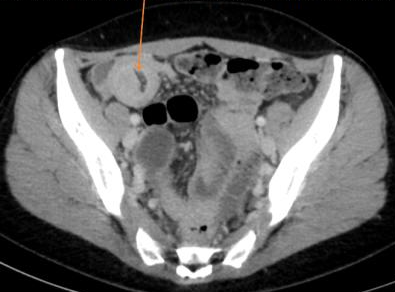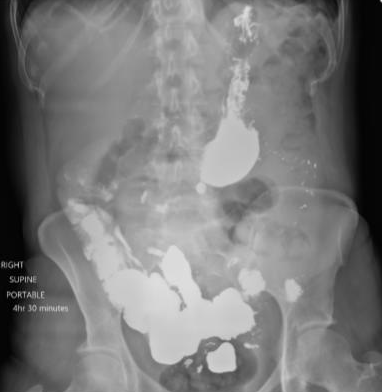Sunday Poster Session
Category: Infections and Microbiome
P1319 - Rethinking the Viral-Gut Connection: RSV-Associated Intussusception in an Immunocompetent Adult
Sunday, October 26, 2025
3:30 PM - 7:00 PM PDT
Location: Exhibit Hall

Abby Kunitsky, DO
McLaren Macomb
Mt. Clemens, MI
Presenting Author(s)
Amer Mansoor, MD1, Abby Kunitsky, DO2, Cole Bernstein, 3, Richard Spinale, DO4, Amelia Pasley, DO5
1Garden City Hospital, Detroit, MI; 2McLaren Macomb, Mt. Clemens, MI; 3Kansas City University, Kansas City, MO; 4Garden City Hospital, Garden City, MI; 5Corewell Health, Farmington Hills, MI
Introduction: Intussusception occurs when a segment of bowel telescopes into an adjacent segment, causing obstruction. While common in pediatrics, adult intussusception is rare, comprising 1-5% of mechanical bowel obstructions. Pediatric cases have been associated with viral infections, particularly respiratory syncytial virus, which induces lymphoid hyperplasia, leading to altered peristalsis and bowel invagination. We present a case of ileo-ileal intussusception in an adult following RSV infection, raising questions about viral contributions to adult intestinal pathology
Case Description/
Methods: A 39-year-old African American female with BRCA2 positive breast cancer and a total abdominal hysterectomy (2 months prior to presentation) presented with acute abdominal pain. She denied nausea, vomiting, bowel habit or stool changes. She was diagnosed with RSV 2 weeks prior. Exam revealed lower abdominal tenderness without peritonitis. Labs showed WBC of 15.2×109/L with normal lactate. CT demonstrated a 7 cm ileo-ileal intussusception without an obstructing mass (Figure 1). Endoscopic evaluation was limited as deep enteroscopy was unavailable. Small bowel follow-through demonstrated no obstruction (Figure 2) thus she was managed conservatively with bowel rest and IV fluids with gradual symptom resolution. A repeat outpatient CT of the abdomen/pelvis with IV & oral contrast 1 month later confirmed complete resolution of the ileo-ileal intussusception. The patient is pending deep enteroscopy evaluation at a tertiary care facility
Discussion: Adult intussusception is typically due to an anatomic lead point; often malignancy. This case suggests a potential association between RSV and intussusception in an immunocompetent adult, a well-documented pediatric phenomenon that is rarely reported in adults. Prior studies have linked other viral infections, including CMV, Epstein-Barr virus, and norovirus to intussusception in immunocompromised adults, supporting the hypothesis that viral-induced lymphoid hyperplasia may trigger transient intussusception. RSV has been shown to affect GI lymphoid tissue, such as Peyer’s patches, potentially leading to transient intussusception even in immunocompetent adults. While most adult cases require surgery for malignancy risk, this case highlights the potential for resolution with conservative management in patients without obstructing masses. Further research is needed to elucidate the role of viral infections in adult intussusception and optimize diagnostic and management strategies.

Figure: Figure 1: Axial view of the CT abdomen/pelvis with IV contrast demonstrating findings consistent with an ileo-ileal intussusception in the right pelvis extending 7 cm. The orange arrow identifies a section of this ileo-ileal intussusception, in craniocaudal dimension.

Figure: FIgure 2: Small bowel follow-through demonstrating contrast passage with no obvious obstruction or contrast extravasation.
Disclosures:
Amer Mansoor indicated no relevant financial relationships.
Abby Kunitsky indicated no relevant financial relationships.
Cole Bernstein indicated no relevant financial relationships.
Richard Spinale indicated no relevant financial relationships.
Amelia Pasley indicated no relevant financial relationships.
Amer Mansoor, MD1, Abby Kunitsky, DO2, Cole Bernstein, 3, Richard Spinale, DO4, Amelia Pasley, DO5. P1319 - Rethinking the Viral-Gut Connection: RSV-Associated Intussusception in an Immunocompetent Adult, ACG 2025 Annual Scientific Meeting Abstracts. Phoenix, AZ: American College of Gastroenterology.
1Garden City Hospital, Detroit, MI; 2McLaren Macomb, Mt. Clemens, MI; 3Kansas City University, Kansas City, MO; 4Garden City Hospital, Garden City, MI; 5Corewell Health, Farmington Hills, MI
Introduction: Intussusception occurs when a segment of bowel telescopes into an adjacent segment, causing obstruction. While common in pediatrics, adult intussusception is rare, comprising 1-5% of mechanical bowel obstructions. Pediatric cases have been associated with viral infections, particularly respiratory syncytial virus, which induces lymphoid hyperplasia, leading to altered peristalsis and bowel invagination. We present a case of ileo-ileal intussusception in an adult following RSV infection, raising questions about viral contributions to adult intestinal pathology
Case Description/
Methods: A 39-year-old African American female with BRCA2 positive breast cancer and a total abdominal hysterectomy (2 months prior to presentation) presented with acute abdominal pain. She denied nausea, vomiting, bowel habit or stool changes. She was diagnosed with RSV 2 weeks prior. Exam revealed lower abdominal tenderness without peritonitis. Labs showed WBC of 15.2×109/L with normal lactate. CT demonstrated a 7 cm ileo-ileal intussusception without an obstructing mass (Figure 1). Endoscopic evaluation was limited as deep enteroscopy was unavailable. Small bowel follow-through demonstrated no obstruction (Figure 2) thus she was managed conservatively with bowel rest and IV fluids with gradual symptom resolution. A repeat outpatient CT of the abdomen/pelvis with IV & oral contrast 1 month later confirmed complete resolution of the ileo-ileal intussusception. The patient is pending deep enteroscopy evaluation at a tertiary care facility
Discussion: Adult intussusception is typically due to an anatomic lead point; often malignancy. This case suggests a potential association between RSV and intussusception in an immunocompetent adult, a well-documented pediatric phenomenon that is rarely reported in adults. Prior studies have linked other viral infections, including CMV, Epstein-Barr virus, and norovirus to intussusception in immunocompromised adults, supporting the hypothesis that viral-induced lymphoid hyperplasia may trigger transient intussusception. RSV has been shown to affect GI lymphoid tissue, such as Peyer’s patches, potentially leading to transient intussusception even in immunocompetent adults. While most adult cases require surgery for malignancy risk, this case highlights the potential for resolution with conservative management in patients without obstructing masses. Further research is needed to elucidate the role of viral infections in adult intussusception and optimize diagnostic and management strategies.

Figure: Figure 1: Axial view of the CT abdomen/pelvis with IV contrast demonstrating findings consistent with an ileo-ileal intussusception in the right pelvis extending 7 cm. The orange arrow identifies a section of this ileo-ileal intussusception, in craniocaudal dimension.

Figure: FIgure 2: Small bowel follow-through demonstrating contrast passage with no obvious obstruction or contrast extravasation.
Disclosures:
Amer Mansoor indicated no relevant financial relationships.
Abby Kunitsky indicated no relevant financial relationships.
Cole Bernstein indicated no relevant financial relationships.
Richard Spinale indicated no relevant financial relationships.
Amelia Pasley indicated no relevant financial relationships.
Amer Mansoor, MD1, Abby Kunitsky, DO2, Cole Bernstein, 3, Richard Spinale, DO4, Amelia Pasley, DO5. P1319 - Rethinking the Viral-Gut Connection: RSV-Associated Intussusception in an Immunocompetent Adult, ACG 2025 Annual Scientific Meeting Abstracts. Phoenix, AZ: American College of Gastroenterology.
